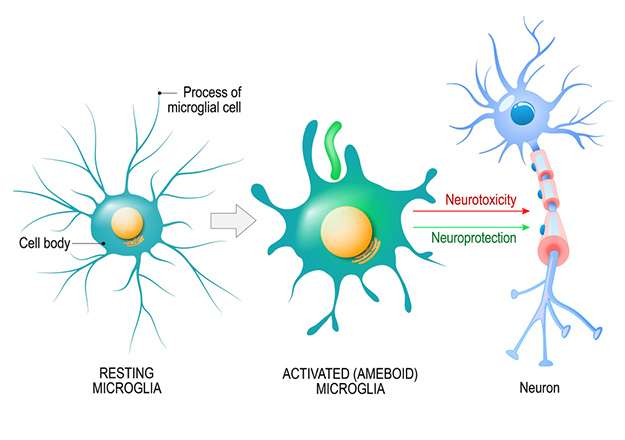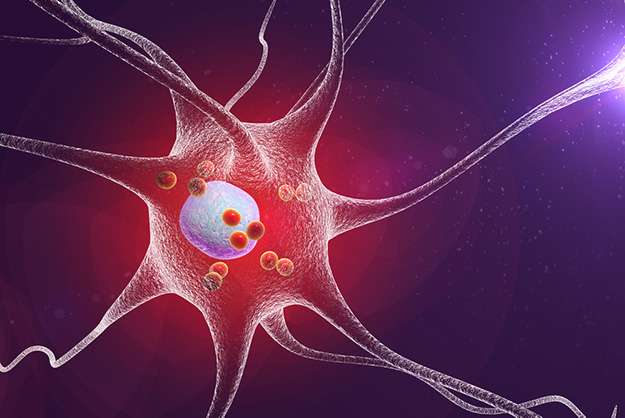As you age, microglia cells change, increasing the risk factor for the genesis of neurological disorders such as Alzheimer’s disease and various others, including neurodegeneration.
RELATED: Decline in Androgen Levels a Result from Aging?
What You Should Know About Neurodegeneration
What is Microglia?

Microglial cells are a kind of macrophage that is prevalent in the central nervous system (CNS). They remove damaged neurons and pathogens and are essential for sustaining CNS health.
Microglia account for approximately 0.5–16.6 percent of the total cell population in the human brain, depending on the anatomical area. The quantity and function of microglia are strongly regulated by the local microenvironment and interactions with adjacent cells under physiological settings.
Microglia have variable morphological traits, lysosome content, membrane composition, electrophysiological activity (i.e., hyperpolarized resting potentials and differential membrane capacitance), and gene transcriptome profiles depending on their anatomical structure or activation profile.
RELATED: 8 Tips to SLAY 2021 and Optimize Your Health This Year
What Is Neurodegeneration?

Neurodegeneration is the gradual loss of neuron structure or function, which can result in cell death. Many neurodegenerative disorders, including amyotrophic lateral sclerosis, multiple sclerosis, Huntington’s disease, Parkinson’s disease, Alzheimer’s disease, and prion disorders, are caused by neurodegenerative processes.
Neurodegeneration can be detected at many different levels of neuronal circuitry in the brain, ranging from molecular to systemic. These disorders are deemed incurable since there is no known technique to reverse the gradual degradation of neurons.
Biomedical research has found numerous parallels between these disorders at the subcellular level, including aberrant protein assemblages (like proteinopathy) and triggered cell death. These parallels imply that treatment progress against one neurodegenerative illness may benefit other illnesses as well.
Senescent Microglia Contribute to Neurodegeneration
![[Senescent Microglia Contribute to Neurodegeneration] Worried man on bed suffering depression crisis and anxiety feeling lost lying sleepless in insomnia_SS](https://yuniquemedical.com/wp-content/uploads/2021/06/Senescent-Microglia-Contribute-to-Neurodegeneration-Worried-man-on-bed-suffering-depression-crisis-and-anxiety-feeling-lost-lying-sleepless-in-insomnia_SS-1-2.jpg)
Senescent microglia have both decreased neuroprotective capacity and modest but continuous release of chemicals that cause inflammation, which is found in neurodegeneration (Koellhoffer et al., 2017). Dystrophic microglia have been seen in both elderly and neurodegenerative illness patients’ brains.
Increased age is the single most important risk factor for the genesis of neurological disorders such as Alzheimer’s disease. Microglia, the resident brain glial population, primarily linked with both neuroprotection in health and neurodegeneration in illness, may play a substantial role in age-related alterations.
This has led to the development of various mental-related issues, including poor memory, stress, insomnia.
How to Prevent Neurodegeneration
There are various ways for you to slow down or prevent the progression of neurodegeneration.
Improve Your Diet
As it turns out, our food has a significant impact on the levels of these essential antioxidants. Furthermore, our fast-paced Western lifestyle with fast food meals raises our chances of developing cancer, heart disease, stroke, diabetes, and other age-related disorders. That’s why you need to replace these unhealthy sugary and fatty foods with high levels of natural antioxidants foods like vegetables, fresh fruits.
Exercise Regularly
![[How to Prevent Neurodegeneration] Middle age beautiful sporty couple smiling happy. Standing with smile on face practicing yoga doing warrior pose at gym_SS_](https://yuniquemedical.com/wp-content/uploads/2021/06/How-to-Prevent-Neurodegeneration-Middle-age-beautiful-sporty-couple-smiling-happy.-Standing-with-smile-on-face-practicing-yoga-doing-warrior-pose-at-gym_SS_-2-2.jpg)
Going for a jog or taking a trip to the gym will get you into shape, maintain your health, and prevent neurodegeneration progression. You don’t have to run a marathon or work out at the gym for 8 hours every day. Simply a healthy workout routine that involves both aerobic (cardiovascular) and anaerobic (muscle-strengthening) activity. Remember, you don’t have to accomplish everything all at once.
The majority of health professionals recommend 30 minutes of intense exercise three times each week. Walking, hiking, jogging, aerobics, intense sports like tennis and golf, and gym exercises might all be part of your fitness regimen. If nothing else works for you, you can also get help from medical weight loss.
Consider Using Growth Hormone Replacement Therapy
Growth hormone feeds our growth and aids in the maintenance of tissues and organs throughout our lives. However, as we age, the pituitary gland gradually diminishes the quantity of growth hormone it generates. Growth Hormone Replacement Therapy is one solution to help combat neurodegeneration.
GHRT benefits include:
- Reduced risk of osteoporosis and increased bone mineral density
- Improve memory and cognitive speed
- Increased mood and overall feeling of well-being
Aging-related health issues like neurodegeneration and Alzheimer’s can negatively impact your life. Still, with the right course of action, you can prevent them with ease. Things like a healthy diet, daily exercise routine, or a change of habits can go a long way.
Get SAFE, EFFECTIVE, and CUTTING-EDGE therapies for health optimization at YM. Contact us to schedule your FREE consultation at our four offices in Florida, Ocala, Fruitland Park, and Daytona. 2020 is DONE. Let’s SLAY 2021!
UP NEXT:

